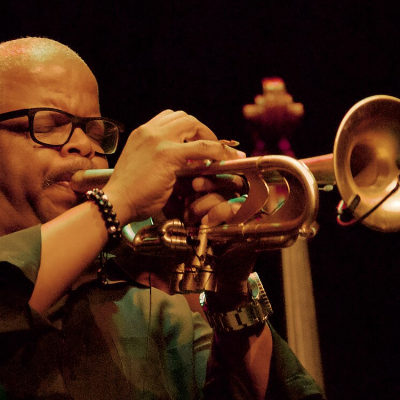_____
In the fall of 1944, shortly following his medical discharge from the Navy, Artie Shaw formed a 17 piece band (without strings) that featured Barney Kessel on guitar, Dodo Marmarosa on piano, Ray Coniff on trombone, and the brilliant trumpeter Roy Eldridge, famous for his work with Gene Krupa’s band in the early 1940’s. The band, according to noted critic Leonard Feather, was “quite impressive” and exhibited “a refreshing lack of bad taste and bombast.”
This era of Shaw’s band resulted in several excellent recordings, among them Eddie Sauter’s arrangement of “Summertime” (featuring Eldridge) and “Time is All You’ve Got,” in which, according to Shaw biographer John White, “Eldridge did not want to play the ‘growl’ trumpet chorus, fearing that he would be accused of copying Duke Ellington’s expert in that department, Cootie Williams.”
During Eldridge’s year long stint in Shaw’s band, he experienced several incidents of racial prejudice and discrimination, including being barred from entering a venue where his name appeared on the marquee. White writes that “finally allowed entrance, he played the first set with ‘tears rolling down my cheeks.’” Shaw’s support of Eldridge was remembered by him as being “real great. He made the guy [that wouldn’t let me in] apologize…and got him fired.”
In Ava: My Story, Ava Gardner (Shaw’s wife at the time) describes what may be the same episode, an engagement when Eldridge didn’t make it to the bandstand:
“Artie was furious, so much that he was still steaming when we went out the stage door after the first set to enjoy a cigarette. And there was Roy Eldridge, sitting in the gutter, holding his trumpet and crying, the tears pouring down his cheeks. He hadn’t been allowed in the building. He’d been told: ‘A n—-r playing in a white man’s band? Don’t give us that crap. Get out of here, n—-r, if you know what’s good for you.’ Artie was often testy. This time he was not testy, he was volcanic with anger. The result: Roy Eldridge was allowed into the building. At that next set, Roy Eldridge blew his horn until the notes shimmered off the rooftops. He played a tune called ‘Little Jazz.’ In those days, when the kids really liked a number, they stopped dancing and clustered around the bandstand. This time they hemmed in to listen to Roy’s fantastic playing. I’ll never forget the occasion. Roy stood there blowing his heart out, tears streaming down his face. It was heartbreaking. I wept with him.”
Shaw sympathized with Eldridge’s situation. In a piece written by the critic Whitney Balliett, he quotes Shaw saying “It was very tough on him in my band, just as it had been for Billie Holiday when she was with me in the thirties. When I hired Roy, I told him that he would be treated like everyone else in the band, and that he would be paid very well, because he was the best. I told him that I could handle racial matters when we were on the stand, but there was very little I could do when we were off. Droves of people would ask him for his autograph at the end of the night, but later, on the bus, he wouldn’t be able to get off and buy a hamburger with the guys in the band. He thought he was traveling through a hostile land, and he was right.”
Shaw disbanded this version of his band in 1945 and formed a new orchestra – this time with strings – and worked with outstanding vocalists, including the Chicagoan Mel Torme. Eldridge, meanwhile, formed a big band of his own, was financially challenged, and returned to small group work.
_____



































another sad story of racism in this country. We still have a long way to go